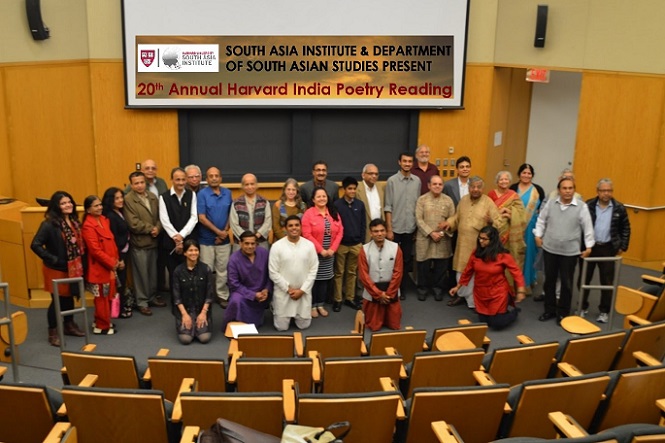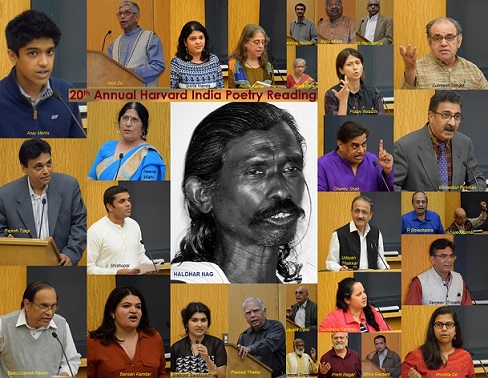Contribute
|
The “Environment†– Poetry Of The Silence And The Sorrow 20th Annual India Poetry Reading At Harvard University |
Sunayana Kachroo and Maneesh Srivastava
05/25/2016
John Keats said “The poetry of the earth is never dead,†referring to the grand landscapes on the canvass of the earth created by the greatest forces of the nature. “Environment" is defined as something we live in, something that we interact with. A sister concept is "surrounding". In addition to the physical assets created by nature that surround us, there is the "surrounding" of love, violence, hatred, bigotry, friendship, wealth, poverty and thoughts that we have to live with. Every entity is interlinked and is connected in the grand cycle of life. We are in an environment and environment is within us. This makes “environment†an all-encompassing entity, startling and divine! “We are the products of our environment!†declared the Vedas. On May 15, Sunday, thirty two poets of South Asian origin talked about the interpretation of the environment and dabbled with the various aspects of it through poetry and songs. This year marked the 20th year since the India Poetry Reading group was formed. This event was hosted by the South Asia Institute and the Department of South Asian Studies of Harvard University. The program started at 2:30 PM. Dr. Bijoy Misra, an Associate in the Department of South Asian Studies and the Convener for the Group gave a short history of the program since 1997. He acknowledged the support of late Catherine Galbraith and Swami Sarvagatananda who helped generate support for the original event on the occasion of the Golden Jubilee of India’s independence from the foreign rule. He acknowledged the support from Sajed Kamal, Rosie Kamal, Alok De, Maya De, Jaspal Singh and Hardeep Mann through the years. South Asian Poets of New England was formed in 2008 and hosts the quarterly poetry reading events in the local area. It is merged with the newly formed India Discovery Center, Inc., a new nonprofit group dedicated for scholarly research on India. Dr. Misra presented a short review of the arrangement of the poems for the afternoon to weave through the grandeur of the nature to the pollution and destruction, marching on to water scarcity, economic deprivation and suicide. He said the conclusion was focused on human duty towards environment through a special poem in Sanskrit dispatched from India. Dr. Misra chose to start the meet with the recitation of a poem by a poet in Koshali language who was rewarded with a Padmasri award last January by the Government of India. Haladhar Nag had to drop out of school at 3rd Grade because of family difficulties. He supported his family by working as a manual labor. He got familiar with literature by interacting with High School students when he worked as a cook in the dormitory. He started composing at the age of forty and at sixty five is the most popular poet in the region. Dhodha Baragach “That Old Banyan Tree†narrates the lone tree standing at the entrance to the village and is the witness to the life in the village. “Sees everything, knows everything, checks each, and hears all, Never speaks a word, never talks, never opens to tall or small!†said the poet. The next poem was chosen from the Ramayana of Valmiki, written around second century BC. It was the description of the River Ganga as viewed by Rama in the story. The beautiful narrative stanzas were rendered in Hindi by Sri Sanjeev Tripathi in a poem entitled Ganga Chaupai. This was followed by a Nepali poem Kalajayee Himalaya, expressing the timelessness of the magnificent Himalyas. The poet Dr. Shiva Gautam was acknowledged for his contributions to the events in SAPNE. He would be leaving Harvard for an assignment in Florida. The nature poems were followed by a poem in Gujarati by a visiting poet Sri Udayan Thacker. He read the English translation “Familyâ€. Sajed Kamal continued with a poem in English “Bamboo Forest†and Rosie Kamal read a translation “Sunflowerâ€, the original in Bengali by the Bangladeshi poet Mrs. Sufia Kamal. These were followed by Prem Nagar with a Hindi poem ye main kya gungunA raha hu,n “What are these I am murmuring?†The set of four poems connected nature to human life. Young poet Anay Mehta reminded the contradictions in human activity to preserve the environment. We print out posters telling people to save the trees, But we make the posters by cutting down other trees! Aditya Nochur followed with an energetic rendition of “Justicia Ambiental†calling for environmental justice and healthy living for native people, who are displaced from their natural habitat because of development efforts.. Maya De followed with a poem in Bengali entitled Para Protibashi lamenting the change of landscape around her old neighborhoods in India she left back just a few decades ago and the changing neighborhood in Cambridge, MA, where she currently lives. Bansari Kamdar’s poem in English “Letter to the Lost Girls Yearning for Roots†was a call to the youth Remember the wisdom of the trees, the deepest roots that you can grow are always within yourself! Subhash Sehgal’s Hindi poem Parivesh connected life to nature. The beautiful short Bengali poem Dheebor by the Bangladeshi poet Badiuzzaman Nasim spoke the poignant life of the fisherman in the sea. Fishermen live in waters, they fish in water and then one day they get lost in the waves of the seas! The final poem in the segment was by the veteran Gujarati poet Jayant Dave who recited a poem Palak vaarma Pavan, a dialog between a husband and wife when one of them is no more! Dr. VKS Shastry’s Sanskrit poem Parivesh and its translation was read by Janmejay Shishupal. The poem gave a voice to Earth to complain about the heat and pollution. Srabonti Bandyopadhyay presented the English poem “Hey, Look at Meâ€, a cardinal on the road talking to the unrelaxed commuter. Neena Wahi followed with a Hindi poem Kal kaa Sapnaa, a dream to save the climate for the future. R. Balachandra added a positive message in “Free to Roam†to affirm new forestation and creation of new habitat for the lions in India. Rajesh Tyagi in his powerful Hindi poem Hum bhee Aur Tum bhee, painted the contrast of the rich and poor in the same environment. Social injustice leading to farmers’ suicide was the next topic in the emotional rendering of the Hindi poem Kaisaa Din by Jaspal Singh. Sunayana Kachroo recited the Kashmiri poem Do Gazz Zameen, how a farmer cannot feed his family and starves. She followed to read the Hindi poem Yogitaa by Rachna Pandit talking about the news story about a girl collapsing while on way to fetch water! Paromita De transferred the destruction of climate to the destruction of society through the English poem “Humanity’s Atmosphereâ€. She was followed by Ipsita Nanda with her poem in English “A Dreamer's Dreamâ€, a wishful thinking for a world without hatred and ill feeling. The veteran Gujarati poet Pramod Thaker followed with a beautiful rendition of the poem Shum lavya chho, an internal reflection of an immigrant being checked at the airport in the new country. Poppy Awasthi recited an Urdu poem Roushan daanome.n dhuaa.n hi dhuaa.n, commenting on the self-annihilation mode of human progress. The poet is stunned with smoke everywhere. She also read the Hindi poem Yah Kiasaa Parivesh by Maneesh Srivastava that spoke about merciless killings in society. Alok De brought a political angle through his Bengali poem Dusita Rajnaitik poribesh--- Madhya Prachya--- Kar Dosh? – “who is responsible for the calamity in the Middle East!†We had time for a ghazal in Urdu by poet Dr. Muneebur Rahman in Raat. In a beautiful play of words, the poet described the effect of memory in human mind. We always sleep in hope! He was followed by a poem in English by Anil Mehrotra read by Chandu Shah. With a throbbing intensity the poem “Oh God†described the internal conflicts of a fatal suicide bomber. Chandu Shah then read his own poem in Gujarati entitled Kavi o ne dhaak dhamaki. In a humorous rendering the poem warned the poets to refrain from the overuse of the words related to the environment. The final reading of the afternoon was by Mr. V.S. Ramapriya who read eleven stanzas of a hundred stanza Sanskrit poem Parisara-niitishaakam by Professor Mangesh Nadkarni from India. The poet sang: The Earth is our only place where we can live and flourish. It is mankind’s obligation to protect it and cherish! Dr. Misra thanked all attendees. Particular thanks were due to Diana Kimngan Nguyen of South Asia Institute to help out with the logistics. All were felicitated with tea and light refreshments hosted by South Asia Institute. The group picture was taken by Jjay Shishupal. The program ended at 5:30 PM.
You may also access this article through our web-site http://www.lokvani.com/

